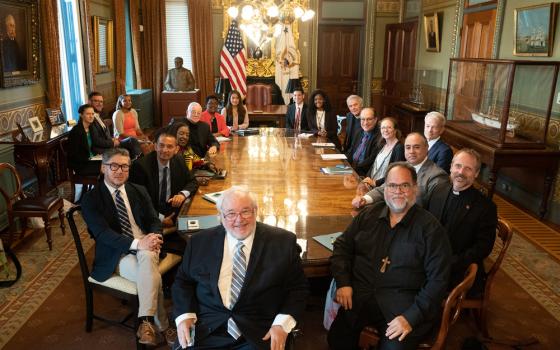One day after the first presidential debate, each candidate's campaign faces some obvious and some not-so-obvious decisions in the two weeks before the next debate (Oct. 9, a town hall-style event at Washington University in St. Louis). The debates reinforced certain perceptions of the candidates, to be sure, but many lingering questions were left unaddressed, which the campaign teams want to put to rest. And, which is not the same thing, each candidate faces some decisions too.
Hillary Clinton, because of the rough treatment she has received over the years, has surrounded herself with aides known for their loyalty, not for their willingness to challenge her. And Donald Trump defines the celebrity CEO culture in which every whim of the leader is taken as if engraved on stone tablets. Pity the people who have to tell either of these two that they need to shape up, although I fear the tougher task awaits Team Trump. Clinton, at least, is accustomed to being beat up in the political arena. For Trump, the experience of falling flat on his face in front of the largest television audience to watch a debate in history is new to him, and it must be the greatest threat to his self-confidence ever.
Let's start with the Clinton campaign. They are certainly feeling good about her performance on Monday night. But, as Nate Silver pointed out, we need to wait and see, especially in this bizarre year, how the polls will be affected. Silver sent up a cautionary flare:
What if Clinton doesn't improve in the polls -- or they even move toward Trump? Then that ought to be scary for Democrats, obviously. While Trump's lack of preparation could also potentially cause him problems in the second and third debates, he showed off some of his worst qualities on Monday night, appearing to be the weaker leader than Clinton and less presidential than her, according to the CNN poll. If undecided and marginal voters were willing to shrug off Trump's performance, then perhaps they really are in the mood for the sort of change that Trump represents, his faults be damned.
This is what has to worry the campaign, that there are a lot of voters who have been so alienated from politics, they haven't voted in years, but they hear Trump, and they like what they hear, and they are immune to normal considerations about a candidate's aptitude for office. This should scare the country, not just the campaign: How did so many fellow citizens get so angry for so long that they would consider Trump a plausible remedy?
Hillary handled the question about her emails perfectly last night. She made no excuses. She said she was wrong to do it and would never do it again. She repeated the meaningless mantra about "accepting responsibility" which is now a rhetorical replacement for actually accepting responsibility. (The traditional understanding of "responsible government" means that when something goes wrong on your watch, you resign.) Meaningless or not, it works. How well did it work? There was no follow-up from either the moderator, Lester Holt, or from Trump. Clinton needs to be able to repeat that answer on auto-pilot, without varying a single word.
Clinton needs a better response to the question about her husband's support for NAFTA and her own obvious sympathy with those who support so-called "free trade." (I write "so-called" because most trade pacts contain hundreds of pages of corporate protectionism.) It should not be so hard to explain that in the early 1990s, after the fall of communism, almost everyone felt a wave of optimism that the benefits of democracy and the market would wash over the world and bring peace, prosperity and stability. There was even a book called The End of History and the Last Man. But, history did not end. It did not even simplify. The free flow of capital was not matched by the free flow of enlightenment. Selfishness became the norm. Even those Chinese leaders still officially wrapped in communist dogmas became rapacious capitalists. It is time to re-assess how trade affects the peoples of the world, not just how it affects, at a macro level, the economies of the world. Case in point: President Obama says that "TPP protects our intellectual property." Our? The Trans-Pacific Partnership protects Big Pharma's intellectual property, not mine. How hard would it be for Clinton to say this?
The next debate is a town hall format. I hate that format for the same reason I do not like comment sections in newspapers or eulogies by family members at funerals. When people untrained in public speaking try to give voice to profound sentiments, it comes out as sentimental. When ordinary people at town halls ask imprecise questions that allow candidates to dodge, little is learned. (Best not write what I think of those with enough time to comment regularly!) Clinton needs to pull a page from her husband's playbook and get comfortable engaging real people on their terms. She is actually very good at this in a small group sitting around the table. She needs to imagine the debate as a bigger table, but same dynamic. Monday night, with the obviously planned exception of Ms. Machado, Clinton did not invoke real people and their stories in her answers, which is a shame. It was the story telling that made the Democratic Convention such a success.
Finally, Clinton needs to prepare a new set of taunts for Trump. She clearly got under his skin Monday night, starting with a mention of the loan from his daddy. He will be prepared for that next time. What else can she raise that will cause him to forget himself? Hint -- The first of her reasons he has not released his tax returns: He is not nearly as rich as he claims.
None of us knows enough about the inner workings of the Trump campaign to know what steps they can take before Oct. 9 to improve his performance. Ever since Kellyanne Conway came on board, Trump's unforced errors on the campaign trail have mostly stopped. Interestingly, Conway herself seemed to commit one such error yesterday, insisting that Trump does not believe climate change is man-made. Is Ms. Conway looking to her next job as communications director for Exxon? In any event, someone in Trump's inner circle needs to convince him that he has come this far, and if he can find even a little discipline within himself, he could win this thing. Will it work? Who knows. What is certain is that Trump's supporters will stick with him at this point even if he were to say he was having second thoughts about building the wall. He can afford to be more moderate and less crazy. Authenticity in the case of a person who is a serial liar is an elusive goal.
As far as I can tell listening to Fox News last night and reading this take on the debate at the National Catholic Register, Team Trump would prefer to insist that he won the debate Monday, that Lester Holt asked unfair questions, that Trump's microphone had a problem, and that the sun rises in the west. No one is willing to admit that he lost the debate because he did not prepare and that, in fact, it is hard to cram in a few days in lieu of a lifetime of attention to public affairs. But what caught my attention was that in the first few minutes after the debate, Trump and his closest aides were saying he held back from bringing up a difficult topic because Chelsea Clinton was in the room. This was classic Trump. He leaves the stage thinking he won because he is a winner. The looks on people's faces and the whispers about "damage control" make him realize the debate did not go so well. He lashes out, and lashes out with a menacing, potentially vicious threat. His team has until Oct. 9 to convince him not to bring up Bill Clinton's affairs. Trying to place even an iota of blame on Hillary for her husband's affairs will not work. And if he mimics some Fox News hosts and blames Hillary for attacking Monica Lewinsky, well, Hillary was not the first wife who had been cheated on who harbored animosity towards the other woman. If Donald doubts this, he can ask Ivana how she felt about Marla.
We have never faced an election like this in which a candidate of obviously unstable character, and who is intellectually slothful to boot, has a real shot at winning the presidency. The triumph of television and the demise of television known as reality TV have played their part. Years of the elites in both parties being more worried about winning the next election than doing what is good for the country have played their part. The influence of special interest money and the professionalization of elections have played a role, the latter a greater role than is usually acknowledged. In any event, we are here now. A binary choice looms, and it is not a difficult choice. For all my disagreements with Clinton and the many understandable concerns about her character, she will not damage the nation on a whim or threaten the peace of the world on a grudge. She is a grown up. Her opponent is not. The choice is easy.
[Michael Sean Winters is NCR Washington columnist and a visiting fellow at Catholic University's Institute for Policy Research and Catholic Studies.]






